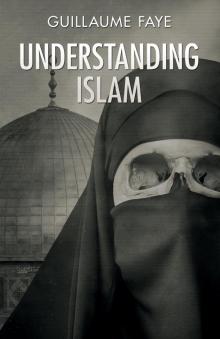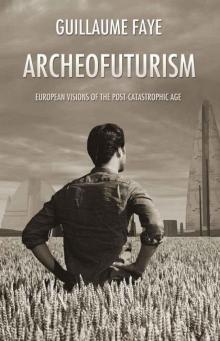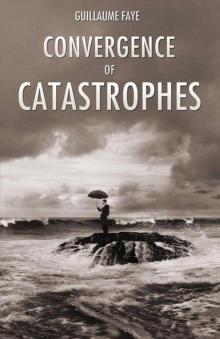Why We Fight, page 8




We’re witnessing the simultaneous cohabitation of (1) abstruse ‘contemporary’ art subsidised by the system, (2) a cult which turns the ‘past’ into museum pieces, and (3) a commercial and consumerist subculture. Contemporary art has become the very opposite of avant-garde art. Its sad impostures haven’t budged for a century. It combines a dull academism, imposture, an absence of talent, and financial speculation. Instead of aesthetics, the system prefers pessimistic or suicidal values of representation, those that come from chaos and deformity, nonsense, pathological abstraction, regression, infantilism, scatology, a psychotic pornography: the exaltation of primitive forms (what the visionary Céline called ‘the tom-tom cult’ or what Chirac calls ‘primitive art’ [102]). Accompanying this wretchedness, this impotence of old men, there’s the vulgar, artificial boom of costume-culture, which is to culture what costume jewellery is to jewellery.
The rejection of aesthetics is crucial to the dominant ideology. For aesthetics, at root, is aristocratic, opposed to massification and fake elites.
*
In its historical essence, the political is a declension of aesthetics. ‘Grand Politics’ aims, in effect, at forming a people in history, making civilisation a creator of great works, turning civilisation itself into a work — a work of art. This conception opposes the modern doctrine that reduces the political to the administrative, that hollows out the notion of a people’s destiny, and rejects the creative projects of the statesman for the sake of the career politician.
(see neo-primitivism; politics)
* * *
Alien
Within a given population, those who are culturally and biologically of non-indigenous origin.
Today it would be better to talk of ‘aliens’ (allogènes) than of immigrants born in Europe of non-European parents, insofar as the majority of them are not ethnically European, but are considered ‘nationals’ solely on the basis of jus soli.[103] Since Antiquity, as Aristotle, Thucydides, and Xenophon noted, it’s been known that every nation that takes in large number of aliens is destined to perish, for these aliens progressively replace natives, who are culturally and/or physically destroyed by them. Such a process is underway now in several parts of France.
At the beginning of the Twenty-first century, the notion of the alien has lost all currency in Europe, either legally, linguistically, or nationally. The law, though, should designate every resident not of European origin as an alien. A Belgian, Italian, or Russian of European origins residing in France is not an alien. The key point is that a people submerged by aliens eventually becomes a minority, strangers in their own land. Such is the logic of the colonisation we’re now experiencing. In the end, the alien becomes the native.
(see colonisation)
* * *
Americanism, anti-Americanism, philo-Americanism
Americanism is the ideological affirmation of the general domination exercised by the United States and its social-cultural model — which are seen as the apotheosis of modernity and Western civilisation.
Americanism is a mental attitude, a consequence of Americanisation, which causes Europeans to lose their identity and sovereignty, but it also comes from the European’s voluntary submission to it, rather than from ‘American imperialism’.
Americanisation is linguistic, dietary, cultural, vestimentary, musical, audio/visual, etc. It substitutes American myths and imaginations for European ones. It’s also evident in Europe’s refusal to assume her own defence (NATO) or practice protectionism to counter American protectionism.
But how appropriate is anti-Americanism, on the Right or Left?
Very little. The danger of anti-Americanism is in the virulence of its jeremiads, which are irresponsible and turn its proponents into hapless victims. Europeans are the leading actors in their Americanisation, in their submission to the United States — for the latter is strong only to the degree we are weak. From its own perspective, the cultural, economic, and strategic domination the U.S. exerts in the world is a normal part of its role as the liar’s poker of history. It’s not in the name of some moral imperative, then, that America is to be opposed, but rather as part of the normal process of competition. Rather than being anti-American, we need to be non-American and Eurocentric.
Philo-Americanism (an idolatry of things American) is often based on an overestimation of American forces and a fascination with it supposed status as the ‘lone superpower’ — an overestimation that ignores its many weaknesses.
In politics and culture, the philo-Americans are the agents of their own deculturation and domination. They are the ones who have Americanised their own culture. For this reason, one can’t actually speak of American imperialism in the same way one spoke of Soviet imperialism. It’s the absence of European resistance, of self-affirmation, of will and creativity that best explains America’s cultural and strategic hegemony.
On the other hand, an overly obsessive anti-Americanism, often ignorant of America, has the paradoxical effect of reinforcing Americanism! For such a mania weakens its cause by infantilising its grievances. In demonising America, it thus actually valorises and magnifies it. Similarly, its negative discourse closes off any affirmation of its own culture and interests, and refuses to take responsibility for itself.
Anti-Americanism is demobilising. Protests against ‘the monopolistic power of American subculture’ are made, for example, without ever considering that it might be France’s self-proclaimed elites who are responsible for the declining influence of her culture. How, after all, can American hegemony be explained, especially its cultural and economic hegemony, if its civilisation is such a nullity?
As mentioned earlier, America is our principal adversary, not our principal enemy. The latter is the mass of alien colonisers, the collaborators (foreign states and fifth columnists), and Islam.
The American-sphere designates that ensemble of countries, principally in Europe, which overestimates American power and its ‘model’, and willingly submits to American hegemony (NATO, commercial diktats, etc.) — unlike the countries of the former Soviet bloc, which were forced to submit. There’s also Americomorphosis, that is, the systematic mimicry of American cultural forms — that reflect of every colonised mentality. Along with this deculturating tendency comes a not unrelated ‘Afromorphosis’, since the Americanisation of mores encourages Europe’s abandonment of her own ethnic identity.
What’s needed are Eurocentric practices — not an ineffectual anti-Americanism.
(see competition; designation of the ‘enemy’ and the ‘friend’; ethnocentrism)
* * *
Anti-Racism
In the guise of combating racism and xenophobia, this doctrine encourages discrimination in favour of aliens, the dissolution of European identity, the multi-racialisation of European society, and, at root, paradoxically, racism itself.
Like the Greens, whose ideological demands do nothing to protect the environment, but surreptitiously promote a concealed Trotskyist agenda, anti-racists use their fake struggle against racism to destroy the European’s identity, as they advance cosmopolitan and alien interests.
Anti-racism, moreover, translates into a racial obsession and contradicts itself, since its partisans deny the existence of races. In promoting open borders and dogmatically encouraging multi-racial society, anti-racists end up objectively provoking racism.
The dominant ideology imposes a quasi-religious anti-racist faith that promotes integration into its politically correct society. Anti-racism is quintessentially a form of intellectual terrorism. Whoever disapproves of immigration or affirms the superiority of European civilisation — and identity — whoever denounces the evils of multi-racial society, whoever observes the ethnic character of the growing criminal element — is demonised and branded by media, society, and the law as a ‘racist’.
Touchstone of the self-righteous, anti-racism is the most advanced expression of postmodern totalitarian ideology. It demonises all forms of rebellion and anti-system opposition. Similarly, it neutralises and keeps potential dissidents within the system’s ideological bounds. A certain intellectual Right, hoping not to alienate the ruling powers, has in this way been recuperated, marginalised, and subjected, losing in the process any hope of being publicly recognised. In effect, it endeavours to collaborate with the enemy and obey its dictates, somewhat like the Orthodox Church under Stalin. This egghead Right (it’s necessary to mention it, for it’s a textbook case) is not content with publicly declaring itself to be ‘anti-racist’, but goes so far as to denounce whoever publicly defends his European identity as a ‘racist’. Incredible, but true.
This all goes to show the paralysing and integrative power of anti-racist dogma, which demands that its collaborators become informers — which probably isn’t a very sound calculation.
(see xenophilia)
* * *
Archeofuturism
The attitude that approaches the future in terms of ancestral values, believing that notions of modernism and traditionalism need to be dialectically transcended.
Archeofuturism opposes both modernity and conservatism, seeing them as versos of one another and believing that modernity is backward-looking, having failed to realise either its ideals or great projects. Techno-science, for example, is incompatible with modernity’s humanitarian and egalitarian values. The Twenty-first century will see the resurgence of struggles that bourgeois and Western cosmopolitan ideology thought it had long ago buried: identitarian, traditionalist, and religious conflicts; geopolitical fissures; ethnic questions posed at the planetary level; battles over scarce resources. . .no need to develop the concept here, since I’ve devoted an entire book to it — Archeofuturism — to which one can refer.
(see progress, progressivism)
* * *
Aristocracy, new aristocracy
Literally and etymologically, ‘the government of the best’. Second meaning: ‘The class of the best’. The problem is defining the ‘best’ and determining if it actually governs society.
For the Greeks, aristocracy was first of all a mode of government based on the rule of the nobles and the most competent. For Aristotle, aristocracy and democracy did not oppose, but complete and integrate one another according to the complementary logic of apparent opposites.
The idea of hereditary aristocracies is a constant in human societies…even in certain Communist regimes (North Korea), where hereditary power is practiced by a caste of pseudo-aristocratic parvenus, the apparatchiks. The notion of hereditary aristocracy should be treated carefully, for it can lead to sclerosis. A true aristocracy is founded not on the power of money, nepotism, or family filiations, but rather on character and ethics. Those who defend their people before their own interests, those who respond to real anthropological and cultural criteria: this is the criteria for defining aristocrats. An aristocracy has a sense of history and blood lineage, seeing itself as the representative of the people it serves, rather than as a member of a caste or club. Today every traditional European aristocratic family, without exception, has been wiped out or turned into an object of mediacratic manipulation.
To recreate a new aristocracy: this is the work of every true revolutionary project.
What are the qualities of a true aristocrat? Attachment to one’s people, who are served with courage, impartiality, modesty, creativity, taste, simplicity, and stature.
The figure of the bourgeois is very unlike that of the true aristocrat. The decline of European aristocracies, then their disappearance, came once they merged with the bourgeois dynasties. An aristocracy is not juridicially hereditary, for a hereditary aristocracy always decays, and eventually becomes extinct. Every generation of aristocrats, through their acts, must prove that they are worthy of their status. In an archaic and futurist inegalitarian vision of the world, aristocrats would have more rights than others, but also more duties. The principle of heredity is acceptable if it facilitates the selection of elites: that is, if it weeds out the incompetent and helps incorporate capable newcomers. Today, the mere idea of aristocracy is incompatible with the dominant ideology. But every people needs an aristocracy. It’s an integral part of human nature and can’t be dispensed with. The question then is not ‘For or against aristocracy?’ but ‘What kind of aristocracy?’
The ‘nobility’ of today’s media is a caricature, a total renunciation of the aristocratic spirit, a bourgeois instrumentalisation of the tattered remnants of the ‘great families’.
A true aristocracy embodies a people’s essence. It’s not formed by money, but in service to and in leadership of its people. Its rule is one of disinterest, courage, efficacy.
Every aristocracy, such as those we have in Europe, is bound to become confused with an ‘economic elite’ once it degenerates. What’s most needed today is the creation of a new European aristocracy. The only possible workshop in which such an aristocracy can be created is war. Aristocrats are born of war, which is the most merciless of selection processes.
(see circulation of elites)
* * *
Assimilation, assimilationism
The belief that the immigrant masses can become French or European if they renounce their cultural origins.
Assimilationism is, at root, a disguised form of racism. It’s also a utopia. The doctrine of assimilation was born from the quasi-religious and universalist ideals of the American and French Revolutions, as well as the Russian Revolution. It supposes that there are no peoples, that ethnic realities are a fantasy, and that the only thing that counts is the individual as consumer.
Only small minorities can be assimilated. Never in the history of mass immigration has a people been assimilated by those among whom they’ve settled. Faced with the present failure of assimilation, the public powers have adopted a strategy of ‘integration’ and ‘communitarianism’. But here too they have failed.
Worse: Muslim and alien ‘minorities’ have ceased, in many areas where they live, to be minorities and have turned the tables on Europeans, who are compelled to assimilate the culture and mores of the colonisers! All assimilation is equivalent to cultural genocide, for the assimilator or the assimilated.
(see communitarianism)
* * *
Autarky of Great Spaces
The organisation of the world economy into autonomous, self-centred great spaces, in opposition to globalism’s capitalist and free trade dogmas.
Autarky, as defended by the German school of Grossraumautarkie[104] and today by the French Nobel Prize recipient, Maurice Allais, is a response to globalist economics. The autarky of great spaces is no obsidional closure, but an exercise in contingency: only those things that can’t be produced domestically are imported. International exchanges are thus limited, but not suppressed. The objective is political and energy independence, as well as the protection of native industries. At the same time, autarky resists the extremely fragile ‘new economy’, which comes with globalisation, limiting the participation of transnational firms and extra-European financial powers within the European economy. It also concerns itself with the workforce, preventing the employment of non-Europeans, except in special, highly select cases, which can’t be filled by Europeans. Autarky would avoid dependence on imports, creating a vast interior market (Great Europe), capable of absorbing its own products, thus immune to foreign economic reprisals. Autarky’s principle is not the exclusion of imports, but of dependence.
Autarky cannot be practiced solely by France, but must assume a European continental dimension. It’s the inverse of free trade — for it rejects the EU’s open borders, which contributes to unemployment and renders economic revivals ephemeral and haphazard, impinging upon European economic independence. Autarky also has the advantage of discouraging outsourcing, avoiding its multiplier effects within protected economic spaces.
Free trade critics of autarky contend that it would ruin the European export market. This is false: autarky would promote the multiplication of inter-European commercial flows based on commercial preferences for community-made products. A French enterprise would accordingly be obliged to furnish products for European rather than for international markets (if these products are available).
To be viable, the planetary economy needs to be organised into relatively impermeable continental spaces that regulate the exchange of merchandise and capital, as well as labour, organising itself into regional modes of production and consumption. Such a model would also combat the cultural homogenisation that comes from concentrated modes of production and consumption, permitting each ‘great space’ (especially in the Third World) to maintain its own economic identity and autonomy.
In respect to energy (and thus ecology), the autarky of great spaces would maximise one’s own resources, freeing it from the present ‘all oil’ logic. Autarky would also affect the cultural realm, policies that in Europe, for instance, would lead to an extension of the idea of ‘cultural exception’,[105] particularly in the field of audio/visual media. After all — it goes without saying — this is already the standard practice in. . .the United States.
Like the formation of Eurosiberia, this vision of autarkic great spaces would undoubtedly be a nightmare for the U.S., for such a self-contained continental space would be perfectly autonomous, especially in respect to energy (oil, gas, etc.) — and no longer dependent on the rest of the world.



















